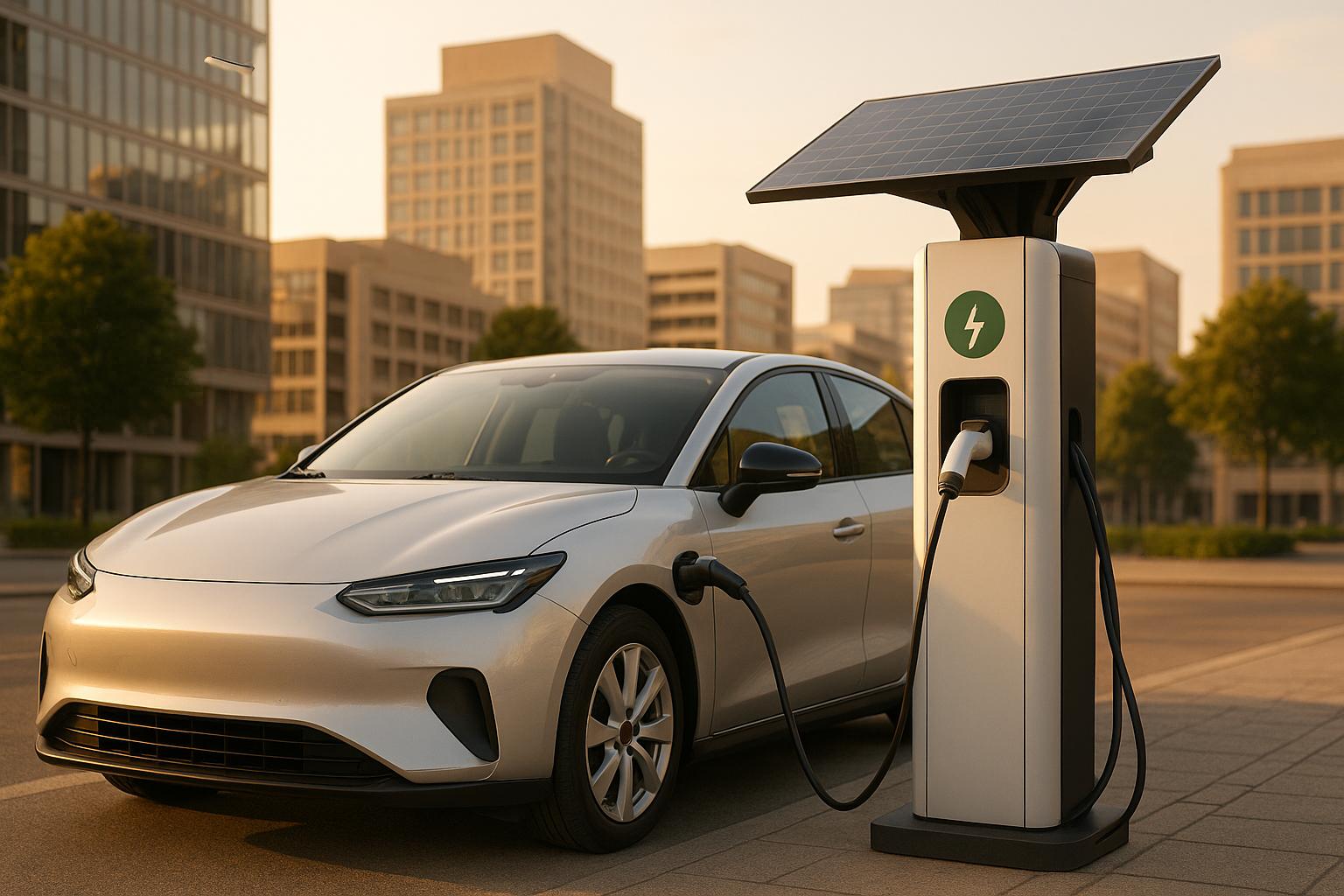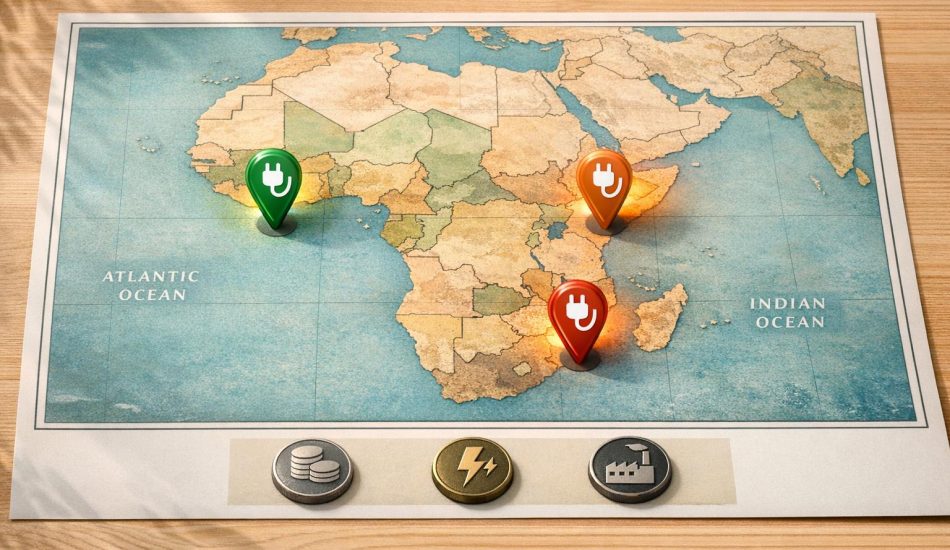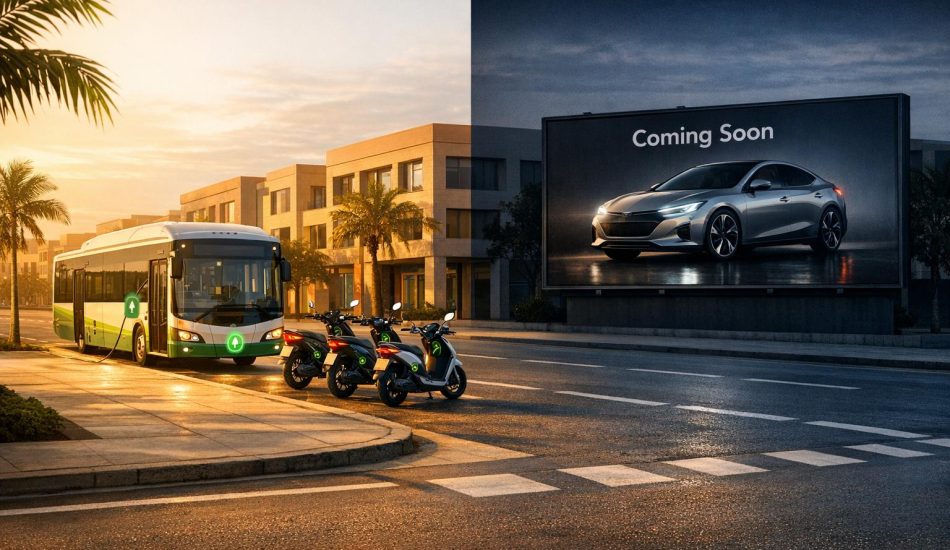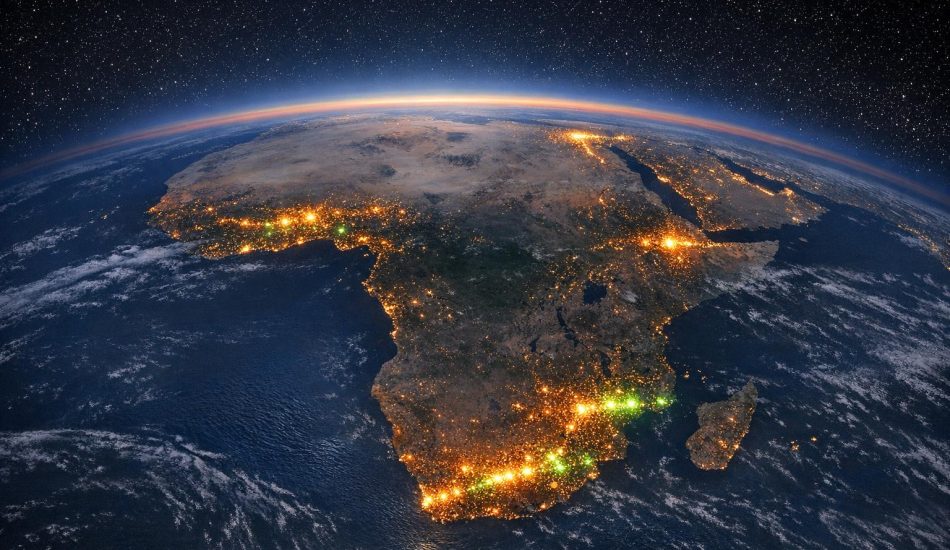
Africa is witnessing a shift toward electric vehicles (EVs), driven by rising fuel costs, environmental concerns, and supportive policies. However, challenges like limited charging infrastructure and high EV prices remain. Five countries – Ghana, Morocco, South Africa, Tanzania, and Ethiopia – are making progress by improving regulations, expanding charging networks, and encouraging local production. Here’s how:
- Ghana: Focused on urban charging networks, tax incentives, and local EV assembly.
- Morocco: Leveraging renewable energy, reducing EV import costs, and boosting local manufacturing.
- South Africa: Private sector-led efforts in charging infrastructure and EV production.
- Tanzania: Early-stage developments in EV adoption, with growing government support.
- Ethiopia: Clear regulations and strategic infrastructure planning, like charging stations along highways.
Each country is taking unique steps to advance EV adoption, offering lessons for other regions. Below is a quick comparison of their approaches.
Africa’s EV Revolution & Urban Mobility Solutions | Anazi Zote-Piper
Quick Comparison
| Country | Market Progress | Policies & Incentives | Charging Infrastructure | Key Drivers |
|---|---|---|---|---|
| Ghana | Growing EV market | Reduced tariffs, tax breaks | Urban networks expanding | Fleet upgrades, cost savings |
| Morocco | Export and local focus | Lower import costs, VAT cuts | Public and highway stations | Renewable energy, production |
| South Africa | Largest EV market | Lower import costs | Fast-charging networks | Corporate fleets, investments |
| Tanzania | Emerging market | Duty exemptions | Urban-focused infrastructure | Government backing |
| Ethiopia | Regulatory-driven growth | Mandates for infrastructure | Highway charging stations | Clear policies, planning |
These efforts highlight how targeted policies, infrastructure initiatives, and public-private partnerships are shaping Africa’s EV future.
1. Ghana
Ghana is taking the lead in West Africa when it comes to adopting electric vehicles (EVs), thanks to a mix of supportive government policies and growing private investments. The government has rolled out initiatives aimed at making EVs more accessible, including improved regulations designed to encourage more people to consider switching to electric cars.
One key factor driving this shift is the expansion of urban charging networks, which has made it easier for EV owners to recharge their vehicles. On top of that, local manufacturers have started assembling electric models, adding momentum to the development of the EV market and creating a more self-sufficient ecosystem.
This combination of policies, infrastructure development, and local manufacturing has encouraged adoption not only among individual drivers but also within commercial fleets. Ghana’s approach offers valuable lessons for other nations looking to promote sustainable transportation solutions across the continent.
2. Morocco
Morocco is at the forefront of North Africa’s transition to electric vehicles (EVs), thanks to its focus on renewable energy and strategic investments in transportation. The government has rolled out policies to make EVs more accessible, including lowering import costs and encouraging local assembly. These efforts are complemented by initiatives like reduced registration fees and reserved parking perks for EV owners, making the switch to electric mobility more appealing.
Expanding the charging network has been a key focus. Public charging stations have been installed in major cities such as Casablanca, Rabat, and Marrakech, led by a state utility. Private companies have also stepped in, setting up fast-charging stations along critical highways to support long-distance travel.
Local production is another driving force. Renault’s Tangier plant now manufactures electric models for both domestic use and export, helping to bring EV prices down and making them more accessible to Moroccan consumers.
Interest in EVs is growing among both private car owners and fleet operators in sectors like tourism and logistics. Urban areas, in particular, are seeing a rise in electric mobility, driven by better infrastructure and increasing environmental awareness.
Morocco’s renewable energy achievements further strengthen its EV ecosystem. The Noor solar complex, one of the largest concentrated solar power facilities in the world, underscores the country’s commitment to sustainable energy. By combining smart policies, technological advancements, and market growth, Morocco exemplifies the broader push across the continent toward greener transportation solutions.
3. South Africa
South Africa’s private sector is playing a key role in driving the country’s electric vehicle (EV) industry forward. Local companies are stepping up by investing in charging infrastructure and looking into opportunities to manufacture electric vehicles. For instance, automakers and tech companies have already rolled out fast-charging networks along key highways. On top of that, several businesses are working on electric commercial vehicles designed specifically to meet local needs.
These efforts are laying the groundwork for a strong EV ecosystem in South Africa. With these developments, the country could become a rising player in electric vehicle production, paving the way for new advancements in the region.
sbb-itb-99e19e3
4. Tanzania
Information about Tanzania’s progress in adopting electric vehicles is limited. Early signs hint at efforts to develop an electric mobility ecosystem, though specific details about government policies or private sector investments are not yet clear. As more updates emerge, Tanzania’s position in the transition to electric vehicles will become better understood.
These early insights provide a foundation for examining how different African nations are approaching EV adoption.
5. Ethiopia
Ethiopia is making strides in developing its electric vehicle (EV) ecosystem by focusing on clear regulations and infrastructure planning. In December 2024, the country introduced the Electric Vehicle Charging System (EVCS) Directive No. 1034/2024. This directive outlines specific requirements for EV charging infrastructure, including a mandate for vehicle importers and assemblers to set up charging stations as a condition for entering the market. These measures are designed to create a strong framework for Ethiopia’s growing EV sector.
For public charging operators, obtaining a license from the Petroleum and Energy Authority is mandatory, while residential charging setups are exempt from this requirement. Public charging tariffs must be approved by the Fuel and Energy Authority, whereas residential EV charging is billed at standard household electricity rates.
Ethiopia’s infrastructure plan complements these regulations by ensuring the strategic placement of charging stations. The plan includes installing EV charging stations every 50–120 kilometers (31–75 miles) along major roads and highways. Specifically, fast-charging stations are required every 50 kilometers (31 miles), and heavy-duty stations every 120 kilometers (75 miles).
Country Comparison Table
Here’s a snapshot of how different African nations are progressing in the electric vehicle (EV) space:
| Country | EV Market Snapshot | Government Policies & Incentives | Charging Infrastructure | Private Sector & Partnerships | Main Adoption Drivers |
|---|---|---|---|---|---|
| Ghana | A growing market | Reduced tariffs and targeted tax exemptions to encourage EV uptake | An expanding network developed through local partnerships | Collaborations with local energy providers | Fleet modernization and fuel cost savings |
| Morocco | Rapidly growing market with export ambitions | Tariff exemptions for selected EV models and adjustments in VAT | Expanding infrastructure accessibility | Involvement of multinational automakers and charging operators | Manufacturing incentives and export focus |
| South Africa | The largest EV market in the region | Comprehensive policies to lower import costs | A well-established fast-charging network | Local production initiatives and corporate fleet upgrades | Sustainability initiatives and energy resilience |
| Tanzania | An emerging market | Import duty exemptions and streamlined registration processes | Gradually developing infrastructure, focusing on urban areas | Partnerships with international manufacturers and local dealerships | Environmental goals and strong government backing |
| Ethiopia | A market setting regulatory trends | Supportive directives mandating investments in charging infrastructure | Strategic placement of stations along major corridors | Investments in local assembly and energy collaborations | Forward-looking regulation and infrastructure planning |
This table paints a vivid picture of Africa’s evolving electric mobility journey. South Africa leads with the most developed EV market and infrastructure, while Morocco is carving out its niche as a hub for exports and production. Ghana’s targeted incentives are driving early adoption, and both Tanzania and Ethiopia are laying the groundwork for long-term growth.
Charging infrastructure varies significantly. Ethiopia’s regulatory efforts focus on ensuring consistent station availability along key transport routes, while Morocco takes advantage of its location to promote both domestic adoption and export-oriented manufacturing.
Incentive programs also differ widely, reflecting each country’s economic priorities. This variety highlights the wealth of opportunities for stakeholders eager to be part of Africa’s growing EV landscape. The strategies showcased here demonstrate how diverse approaches are shaping the continent’s electric mobility future.
Conclusion
The examples of Ghana, Morocco, South Africa, Tanzania, and Ethiopia demonstrate how clear policies and reliable infrastructure are propelling Africa’s electric vehicle (EV) progress. Across the continent, strategic decisions and investments are shaping the future of EV adoption.
Targeted government incentives play a key role. Many African nations have introduced fiscal measures to ease the financial burden on consumers while encouraging local EV manufacturing and modernization. These efforts create a more accessible and competitive market.
Coordinated infrastructure planning is another cornerstone. Expanding charging networks and related facilities ensures that the growing number of EVs can be supported. In several countries, strategic investments have led to charging stations along major routes, offering drivers dependable access.
Robust public-private partnerships are also driving the market forward. Collaborations between governments and private companies are fostering sustainable growth by providing services like financing, manufacturing, and delivery. These partnerships are critical to building a resilient and scalable EV ecosystem.
For stakeholders looking to tap into Africa’s emerging EV market – whether through manufacturing, infrastructure development, or fleet management – there are clear opportunities. Companies like EV24.africa are bridging gaps by offering transparent pricing, flexible financing options, and dependable delivery services.
With smart policies, well-coordinated investments, and dynamic partnerships, Africa is laying the groundwork for a future where electric mobility becomes a widespread and sustainable reality.
FAQs
What challenges do African countries face in adopting electric vehicles, and what steps are being taken to overcome them?
African nations are navigating a range of hurdles in the journey toward electric vehicle (EV) adoption. Key challenges include unreliable electricity supply, scarce charging infrastructure, steep upfront costs, and concerns about grid stability. Together, these issues pose significant barriers to expanding electric mobility across the region.
In response, governments are stepping up with measures like tax breaks and subsidies to make EVs more budget-friendly. Additionally, investments in off-grid charging stations, renewable energy sources, and energy storage systems are helping to bridge gaps in electricity access and charging availability. These initiatives are paving the way for a more dependable and inclusive EV landscape in Africa.
How are African countries building charging networks to support electric vehicles?
The development of charging infrastructure across African nations shows significant variation, especially as the region embraces electric vehicles. South Africa leads the charge with close to 400 public charging stations as of early 2025. Impressively, its network has grown by about 50% annually between 2020 and 2023, positioning the country as a standout in EV readiness within the region.
Meanwhile, countries like Cape Verde are taking a more long-term approach. They aim to build a nationwide charging network by 2030, supported by steady private and commercial investments. Although Africa’s charging infrastructure is still in its infancy, the progress is undeniable. Nations are steadily expanding their networks to keep pace with the growing demand for electric vehicles.
How do public-private partnerships help drive the adoption of electric vehicles in Africa?
The Role of Public-Private Partnerships in Boosting EV Adoption in Africa
Public-private partnerships (PPPs) are proving to be a powerful catalyst for the growth of electric vehicles (EVs) in Africa. By pooling resources, expertise, and funding from both government and private sectors, these collaborations tackle some of the region’s biggest challenges – like inadequate infrastructure, steep upfront costs, and low consumer awareness.
Take Senegal, for example. Through PPPs, the country launched Africa’s first electric bus rapid transit system, demonstrating how teamwork can bring large-scale projects to life. Similarly, organizations such as UNEP have backed initiatives that expand EV charging networks and encourage sustainable industrial development. These partnerships are laying the groundwork for a more accessible and environmentally friendly transportation system across the continent.




